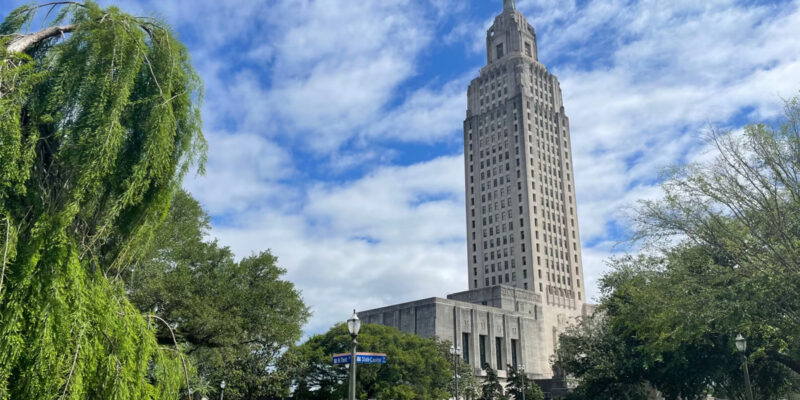Well, it’s not a giant leap for Louisiana fiscal sanity, but it is one small step – maybe even a stride – which puts it ahead of anything since the 1974 Constitution came into being. Meaning we won’t see any giant leaps any time soon.
Republican Gov. Jeff Landry won a partial victory in rejiggering the state’s taxing and spending regimes more towards something comprehensible when the 2024 Third Extraordinary Session of the Louisiana Legislature adjourned, a confabulation he called. Landry campaigned on making a more economic growth-friendly structure and he delivered as best he could with the cooperation of almost all Republicans and a few Democrats here and there – needed since almost all matters required supermajorities to approve, and some awaits voter approval Mar. 29.
On the plus side, a flat individual income tax of 3 percent with standard deductions almost tripled (and more in some cases) ensured far more filers would pay no income tax at all and almost none would not see some kind of tax cut. The corporate franchise tax disappeared and some corporate filers saw a rate cut as well with a new flat corporation income tax rate of 5.5 percent and a higher deduction that makes it likely few corporate filers will pay more. Those that may might find themselves in that undesirable situation because the inventory tax break was reduced, although a mechanism to eliminate that was set in place with uncertain prospects about how well it might work. And voters will consider constitutional changes that increase spending flexibility that could redirect collected revenues to higher-priority purposes and make some provisions in the Constitution turn into statute that will make them more malleable for revenue collection and spending choices.
On the negative side, sales taxes will go up 0.55 percent to 5 percent at the state level for 2025-29 although then dropping to 4.75 percent and now digitized transactions will face that levy. Besides unlocking these, a bevy of exceptions remain, and the biggest waste of all, the Motion Picture Production tax credit, will have its wastage fall by only $25 million annually. Local governments also kept their abilities to collect sales taxes on two things the state government can’t, machinery and equipment and prescription drugs. And for a couple of years three major highway projects will be pushed to the back burner by redirecting vehicle sales taxes from their funding to the general fund.
It’s a win for Landry, almost all legislative Republicans, and fiscal conservatism. How big of a win is another question. It certainly pales in comparison to Landry’s original plans of reducing the sales tax to 4 percent and the corporate income tax rate to 3.5 percent, hacking out wasteful exceptions such as the film credit, and removing the machinery and equipment and prescription drugs exceptions at the local level.
Still, any progress towards lowering and flattening income taxes, broadening sales tax collections through exception elimination, and setting the stage for further reform is more than welcome. Yet regardless of whether Landry takes a victory lap, cheered on by Republicans (and a few Democrats who install in their reelection quiver reminders they helped pass aggregate tax cuts for most individuals and corporations) and fiscal conservatives, the fact remains that having accomplished this and declaring it bold and desirable reform takes it off the table, possibly for the remainder of Landry’s tenure in office even if he serves two terms.
Fully realized reform would mean ultimate goals of no income tax and fewer exceptions and definitively without the most bizarre of those, but won’t be achieved any time soon. The rationale for heading in that direction is a more rational, investing-friendly system increases economic development and ultimately tax collections at lower (or zero) rates. Those who loathe the idea that government should not be in the redistribution game and have less control over people’s lives, joined by special interests benefitting from the current (now slightly less) exemption-riddled system, will be able to say the current changes need digestion, silently hoping somehow the state’s economic development will fall short as evidence the changes weren’t the medicine needed, although it could be these weren’t drastic enough to overcome the inertia of a subpar system with roots sunk in over the decades.
However, as a lesson drawn from this effort, Landry et. al. should pursue at least one immediate reform. Much of the reason the reform of broadening sales taxation at a lower rate failed came from smaller businesses complaining of compliance costs, which the state permits to stay too artificially high by having a horribly decentralized collection method. Policy-makers should start the next round of reform and now by another attempt to centralize sales tax collection like every other state in the union, removing this as an objection to broadening sales taxation as then a prelude to lowering income tax rates further. That’s the next best place for Landry to resume spending political capital striding forth on the issue of fiscal reform.
Advertisement
Advertisement

